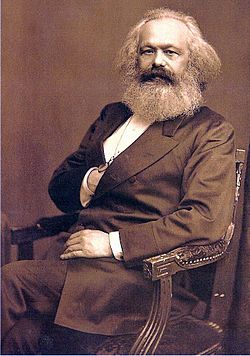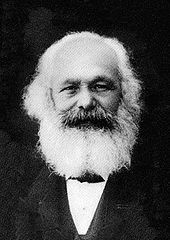Karl Marx
A Brief Note on Hertfordshire from 1842
By Adam Jones-Lloyd
Born 1818 in Trier, Germany, to a wealthy and educated family, Karl Heinrich Marx would become one the most influential philosophers and social thinkers of the nineteenth-century. His political works The Communist Manifesto (1848) and Das Kapital (1867-1894) went on to shape and influence much of twentieth-century history and political developments. Alongside Friedrich Engels, Marx questioned class structure and analysed the system of capitalism in an attempt to reform and eradicate inequality and injustice that he perceived existed.
After earning his PhD from the University of Jena, he turned from academia to journalism and moved to Cologne in 1842 and began writing for the newspaper Rheinische Zeitung (Rhenish Newspaper). By the end of the year he was the paper’s editor. He travelled around Europe and in 1842 came to England. At this point it is interesting to consider that one of the most radical and important figures of modern history travelled through Hertfordshire and the county played a small part in shaping his beliefs. Travelling through Hertfordshire would have meant he would experience the contrast between the industrial cities of London and Manchester with the country’s farmland and rural landscape, witnessing the dichotomy of life in Britain.
The following extract comes from Erinnerungen an England (memories of England) translated from German. This can be found in the book So That Was Hertfordshire: Travellers’ Jottings 1322-1887, by Malcolm Tomkins, featuring a collection of writers’ thoughts that have travelled through the county over the centuries.
In 1842 Marx took a stagecoach journey from London to Cambridge, along most likely what is the Great Cambridge Road or more commonly known today as the A10. Along the journey he made the following observations:
‘In one hour to Broxburn (sic) – through meadows. Quick change…no sooner out of seat than horses changed. Beside New River practically all is ploughed land. Through small towns. Ware and Royston – Plenty of interesting things. Met lady in landau reading or fanning herself. Jockeys [probably postboys] red silk waistcoats, grey hats. Small carts carrying happy bands of people. Sailors – white flat hats, blue jackets, cigars. Everybody wearing town-clothes. Houses has prettiest little gardens with gravel paths and flowerbeds. Coachman not distinguished from passengers – good clothes, white shirt, gloves, smart hat. Polite and conscientious, controlled horses like born coachman. Never used whip. On smooth road, no stone and with four horses all equally good-looking. Reached Cambridge at 9 o’clock.
Marx later moved to London with his family in 1849, where he lived for the remainder of his life and devoted his life to study and organising Communist activity. He died 14th March 1883 aged sixty-four and was buried in Highgate Cemetery, London.
Karl Marx’s notes on Hertfordshire can be found at the Hertfordshire County Archives in the work: So That Was Hertfordshire: Travellers’ Jottings 1322-1887, compiled by Malcolm Tomkins, edited by Graham Javes (Hertford: Stephen Austin & Sons), 1998
Dr. K.F.H Marx, Erinnerungen an England, (Bauschweig, 1842), p.222









Add your comment about this page